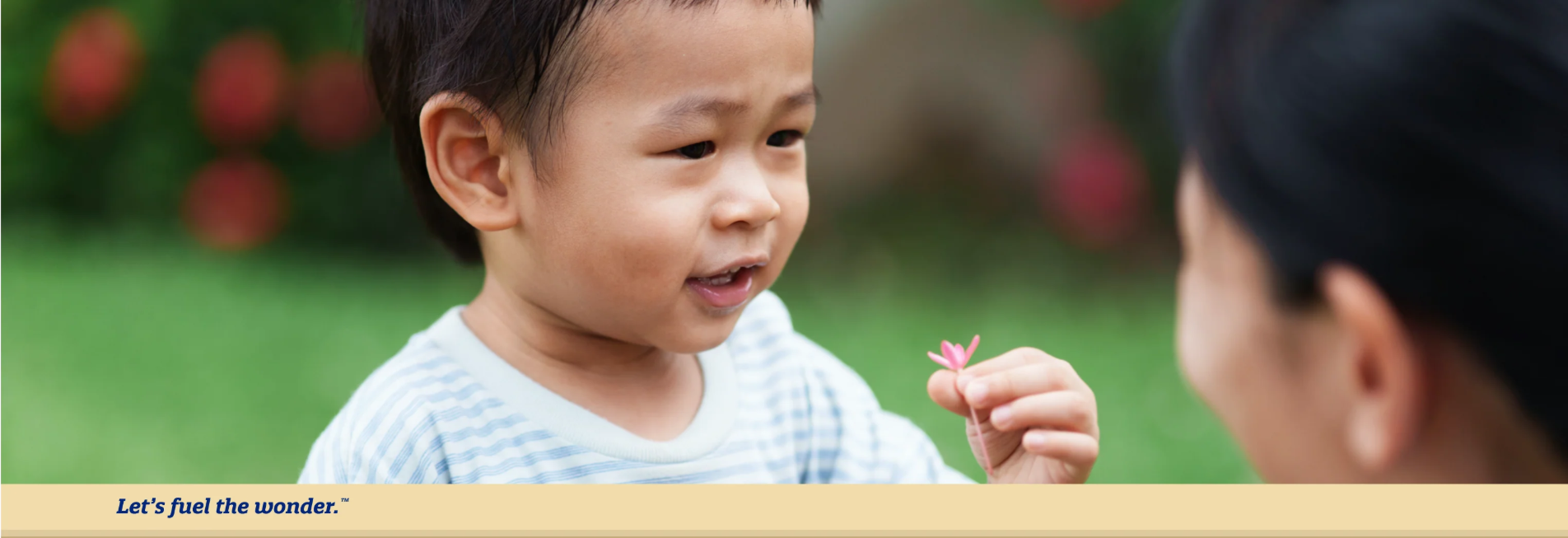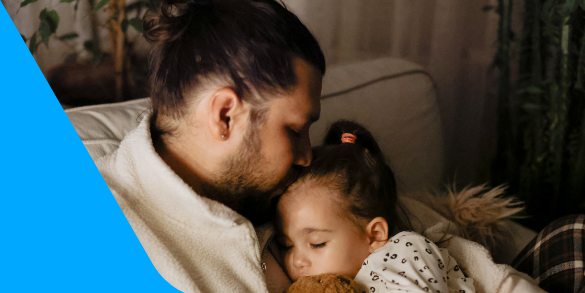SKIP TO CHAPTER

Communication and Social Development in Your 12-Month to 24-Month-Old Toddler
During these months, your baby's verbal skills continue to progress; however, as children concentrate on other milestones (such as walking), their language development may slow down slightly. Their vocabulary is highly variable at this stage: they may utter their first words at 12 months and be able to say five words or more by 15 months. They may understand the meaning of as many as 70 words. At approximately 18 months, there is a spurt in spoken language that often includes self-related words such as "me", "mine" and "no!" when they're upset. Sentences may increase to two, three or four words, such as "you go", "me want juice" and "no wanna go car!", and vocabulary should extend to at least 10-25 words.
Help them along with concise, easy-to-follow language accompanied by gestures. For example, use short sentences and simple language ("big bus", "nice cat"). Use gestures, as in shaking your head when you say “no”. Present one idea at a time, such as “shoes on” while pointing at their feet. If you ask too much at once (e.g., “Put on your shoes, coat and hat”), they may not follow. Hold objects in front of your toddler and name them, then wait for your toddler to respond with a word, gesture or sound.
Encourage your child’s linguistic progression by taking their words and turning them into proper sentences. For example, a request for “milk!” turns into, “You want more milk in your cup.” It will help them expand their vocabulary and learn sentence structure. Play games that include simple directions, such as “Throw the ball to me.”
Between 12–15 months, your child will likely enjoy imitating your actions, such as talking on the phone or stirring a pot. Support your child’s burgeoning imagination with lots of pretend play: role playing, puppets, dolls, blocks, animal figures and objects that they see in “real life,” such as play kitchen utensils, a toy telephone or a small dust broom.
Communication and Social Development in Toddlers 24 Months and Older
Between 24 to 30 months, your child most likely uses language to express what they are feeling and thinking. They can make longer sentences (3-4 words). Their favourite words may be “no”, “me” and “mine”. Encourage them to express their ideas and thoughts. Ask questions about what they see, what you have just read in a book and what they would like to do. Continue to show them how to formulate proper sentences.
When it comes to playmates, they are interested in friendships but have trouble sharing. As they explore their own identity and their place in the world, they may mimic other children, as if to “try it out” to see if it fits them. They may have one or two good friends at this age, but social interaction doesn’t always come easy. Acknowledge their feelings and teach social skills at the same time. For example, you could empathize with their desire to play with a toy but suggest that they let someone else have a turn.
From 30 to 36 months, they continue to develop their capacity to express their thoughts and feelings. By age 3, they should have at least 200 words. They can ask questions, understand sentences with two or more ideas and may know their first and last name. Continue to expand their vocabulary by introducing new words. Prompt interaction with questions that require more than just a “yes” or “no” answer and be patient with their many “why” questions.
Activities to Stimulate Toddler Development
Opportunities to support your toddler’s positive development are all around you. Take advantage of everyday tasks and events to help them learn and develop, all the while providing them with the best nutrition to nourish their milestone achievements.
Communication Development in Toddlers
Strong communication skills can be extremely advantageous as your child matures. Foster their language development right from the very beginning with these simple and enjoyable activities:
Talk them through an activity.
- Explain what you're doing as you do it. Speak clearly.
Let them see your face as you speak.
- This way, they can watch how your mouth makes sounds.
Speak at their level.
- Don't use baby talk or difficult words.
- Stress the syllables.
Listen to them.
- Build their confidence by showing them that what they say is important.
Encourage communication.
- Say the words for objects you see every day.
- Encourage them to say them back.
Don't point out mistakes.
- Instead, repeat the whole sentence saying the word correctly.
Read together every day.
- Early exposure to reading promotes strong reading skills in school-age children.
Read predictable books.
- Soon they'll be "reading" it by themselves.
- Some good examples are: I Went Walking, The Very Hungry Caterpillar, Peanut Butter and Jelly, Little Red Hen, and Goodnight Moon.
Use the mirror.
- Let them make faces and name their body parts.
Explore their world.
- Walk around your neighbourhood.
- Talk about what you see.
Play with writing.
- If they're interested in pencils and paper, let them try.
Play object Hide-and-Seek.
- Hide a favourite toy and ask them to find it.
Play naming games.
- Point to familiar things and ask them to name them.
- Act out action words, like crawl, jump or sleep.
Sing
- Introduce nursery rhymes, finger plays and counting rhymes. Listen to recordings.
- Play imitating games, like "This is the Way We Wash Our Face" or "I'm a Little Teapot."
Social Development in Toddlers
Positive reinforcement, encouragement and support are intrinsic to your child's healthy emotional and social development. Here are some ways to help nurture their emotional and social growth:
Spend time together.
- You are their favourite role model.
Establish a routine.
- They can find comfort and reassurance in the familiar, though you can vary it a little on special occasions.
Hold them when they're upset.
- Speak calmly and quietly until they feel better.
Encourage empathy.
- Share their emotions. Let them see you happy or sad when they are.
Be patient with regressive behaviour.
- Stay calm and try to understand its source.
Read together every day.
- Start with predictable stories, so they can "read" them too.
- Incorporate them into your daily routine.
Use the mirror.
- Let them make faces and name their body parts.
Explore their world.
- Walk around your neighbourhood.
- Talk about what you see.
Share.
- Set a good example with snacks, toys or books.
Why Is Nutrition Important in Toddlers?
Healthy eating is important as it provides the energy and nutrients needed for growth and development. Your toddler will benefit from a variety of wholesome foods each day as they advance their cognitive, linguistic and social abilities. Early childhood nutrition is closely linked to language development. DHA (an omega-3 fat found in breast milk and DHA-enriched infant formula supports cognitive function by facilitating brain growth and development.








